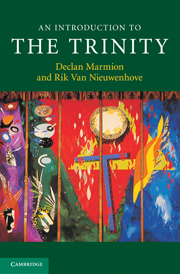Book contents
- Frontmatter
- Contents
- Abbreviations
- Acknowledgements
- 1 Introducing trinitarian theology
- 2 The Trinity and its scriptural roots
- 3 The doctrine of the Trinity: its emergence and development in the life of the Christian community
- 4 Theology of the Trinity from Richard of St Victor to the Reformation
- 5 The Trinity from Schleiermacher to the end of the twentieth century
- 6 Contemporary trinitarian theology: problems and perspectives
- Epilogue
- Index
- References
2 - The Trinity and its scriptural roots
Published online by Cambridge University Press: 05 August 2012
- Frontmatter
- Contents
- Abbreviations
- Acknowledgements
- 1 Introducing trinitarian theology
- 2 The Trinity and its scriptural roots
- 3 The doctrine of the Trinity: its emergence and development in the life of the Christian community
- 4 Theology of the Trinity from Richard of St Victor to the Reformation
- 5 The Trinity from Schleiermacher to the end of the twentieth century
- 6 Contemporary trinitarian theology: problems and perspectives
- Epilogue
- Index
- References
Summary
THE TRINITY IN SCRIPTURE?
If the doctrine of the Trinity did not emerge until about the fourth century, in what sense can it be said that there is a doctrine of the Trinity in the Old and New Testaments? Theologians have come a long way from the old manuals of theology that tried to ‘prove’ that there were clear references to the Trinity in Scripture. Texts such as Gen. 1:26 (‘Let us make man in our image and likeness’) and Isa. 6:3 (‘Holy, Holy, Holy, the Lord God of Hosts, all the earth is full of his glory’) were presented as a clear allusion to the mystery of the Trinity. This kind of biblical interpretation is now regarded as fanciful and strained. Instead, Scripture scholars acknowledge that the Hebrew Bible does not contain a doctrine of the Trinity as such. Yet, just as we cannot ignore the Jewishness of Jesus and his disciples, neither can we discount the Old Testament understanding of God. In this Testament there are what might be termed ‘personifications’ of God. In Word, Wisdom, and Spirit, the God of Israel was active among the chosen people revealing God's plans to them.
Another issue that emerges in this and in the next chapter is what it means to say that a doctrine is ‘based’ on Scripture. A fundamentalist approach tends to merely repeat biblical statements assuming there is no distance between biblical times and today.
- Type
- Chapter
- Information
- An Introduction to the Trinity , pp. 29 - 51Publisher: Cambridge University PressPrint publication year: 2010

